Executive and Administrative (E&A) staff at NUS would have encountered processes at work that require manual and repetitive efforts, which consume much time and efforts.
Help is now on hand to eliminate or reduce such tedious tasks, with the introduction of Robotic Process Automation (RPA) by NUS Information Technology (IT). Executed under NUS IT’s Digital Training Strategy for Organisational Excellence (OE), this initiative seeks to raise the digital literacy baseline of staff and improve their productivity. It also aligns with NUS IT’s strategic plan to create a Digitally Enabled NUS.
Chong Lee Hua, Senior Manager from NUS IT who is the Initiative Owner (IO) of the project, explained that RPA is one of the tools identified to increase digital knowledge at the University and will be made ubiquitous, just like how Microsoft Office is for users.
In August 2019, the first batch of 40 E&A staff was selected from Central Administration and various Faculties to attend the RPA Enablement Programme. This programme was structured into two half-day classroom trainings, followed by a three-month full-time or part-time attachment to the IT Shared Services. This attachment provided the trainees on-the-job opportunity to practise what they have learnt by solving real-life problems, with coaching from NUS IT RPA practitioners.
The first course borrowed use cases based on the Education Record System (EduRec) and Electronic Data Management System (EDMS), which involve massive amounts of repeated tasks such as multiple log-ins, data entries and downloads from the many databases with thousands of records.
Lee Hua noted that the biggest challenge for trainees stemmed from the fear of learning a new tool, which may require some coding.
“We broke the ice by understanding their pain points in the first meeting after the training, thereby building trust and relationship. Then we work together to address their problems.” – Chong Lee Hua, IO of RPA initiative
Peng Wei, Senior Systems Analyst at NUS IT and Co-IO, highlighted that the participants were grouped in teams to better define and tackle their work processes. The IT coaches guided them on selecting the best RPA tools, or even using other apps such as Microsoft Excel macros and MailMerge. He said existing bots were presented to show how easily the apps could be programmed and used. This demo greatly excited the participants as it showed how simple the steps were, which spurred their interest in learning.
Thanks to the immediate hands-on practice after the course and constant monitoring of progress and collaboration with the IT team, 45 bots have been created by the trainees for the most-used platforms such as EduRec, EDMS, SAP and systems-related processes.

The IT RPA team: (from left) Alan Wong Meng Keong, Developer; Peng Wei; Lee Hua; Phyu Phyu Aung, Product Consultant; and Toh Wee Yeow, Product Consultant
A team from the Office of Finance found the three-month collaboration an eye opener. The team members said the meetings focused on solving problems and alternative automation solutions were recommended if RPA could not address the issues. Going through the requirements for RPA also triggered the business users to rethink their current processes.
“A simple bot saved 150 hours of our colleague’s time in a year. For a more complicated bot, if successful, it can save our colleague 975 hours in a year!” – RPA team from Office of Finance
Meanwhile, the Central Procurement Office developed a bot that automates daily downloading of supplier bid documents from SESAMi into a shared folder. This bot performs some 800 downloads each month, saving two man-days monthly.
NUS IT will set up a Community of Practice platform for staff who have completed the training to exchange knowledge, experiences, best practices and enhance their digital skills. It has also lined up more training classes for E&A staff in 2020. The ultimate goal is to roll out the RPA initiative to the whole University, enabling all staff to be digital-literate and improving their efficiency at work.
OE is a strategic initiative undertaken by the University to develop best practices for an efficient and world-class administration to better support NUS’ Vision and Mission. It aims to bring about improved work processes and policies as well as create opportunities for talent development and growth.